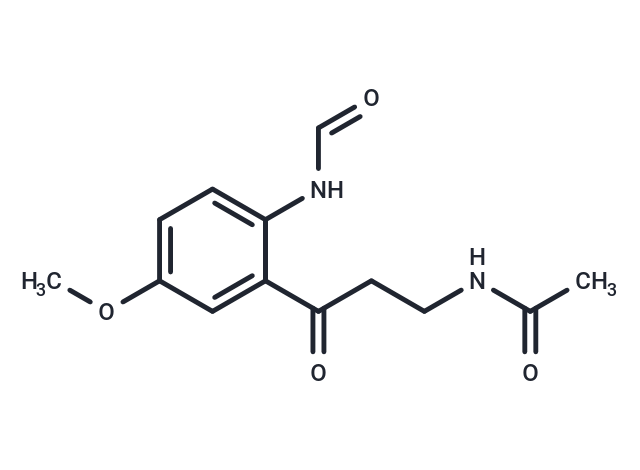Shopping Cart
- Remove All
 Your shopping cart is currently empty
Your shopping cart is currently empty

AFMK (Formyl-N-acetyl-5-methoxykynurenamine) is an active metabolite of Melatonin with antioxidant and free radical scavenging activity. AFMK is a modulator of apoptosis and improves the anti-tumor effect of Gemcitabine in PANC-1 cells.

| Pack Size | Price | Availability | Quantity |
|---|---|---|---|
| 1 mg | $58 | In Stock | |
| 2 mg | $89 | In Stock | |
| 5 mg | $128 | In Stock | |
| 10 mg | $198 | In Stock | |
| 25 mg | $323 | In Stock | |
| 50 mg | $479 | In Stock | |
| 100 mg | $686 | In Stock | |
| 500 mg | $1,480 | In Stock | |
| 1 mL x 10 mM (in DMSO) | $136 | In Stock |
| Description | AFMK (Formyl-N-acetyl-5-methoxykynurenamine) is an active metabolite of Melatonin with antioxidant and free radical scavenging activity. AFMK is a modulator of apoptosis and improves the anti-tumor effect of Gemcitabine in PANC-1 cells. |
| In vitro | In PANC-1 cell, AFMK in combination with Gemcitabine increases the inhibition of the production of HSP70 from 0.47 (Gemcitabine alone) to 0.13 (10 nM AFMK), 0.08 (0.1 nM AFMK) and 0.01 (0.001 nM AFMK)[1]. AFMK pretreatment significantly inhibits DNA damage and shows a very high hydroxyl radical scavenging potential with an IC50 of 338.08 nM[3]. |
| In vivo | In male C57BL mice, AFMK (10 mg/kg; i.p.) significantly reverses radiation-induced decline in the total antioxidant capacity of plasma. Pretreatment of AFMK shows a significantly lower value of comet tail length and % DNA in tail[3]. |
| Alias | Formyl-N-acetyl-5-methoxykynurenamine, Acetyl-N-formyl-5-methoxykynurenamine |
| Molecular Weight | 264.28 |
| Formula | C13H16N2O4 |
| Cas No. | 52450-38-1 |
| Smiles | COc1ccc(NC=O)c(c1)C(=O)CCNC(C)=O |
| Storage | Powder: -20°C for 3 years | In solvent: -80°C for 1 year | Shipping with blue ice. | |||||||||||||||||||||||||||||||||||
| Solubility Information | DMSO: 50 mg/mL (189.19 mM), Sonication is recommended. | |||||||||||||||||||||||||||||||||||
Solution Preparation Table | ||||||||||||||||||||||||||||||||||||
DMSO
| ||||||||||||||||||||||||||||||||||||

Copyright © 2015-2025 TargetMol Chemicals Inc. All Rights Reserved.